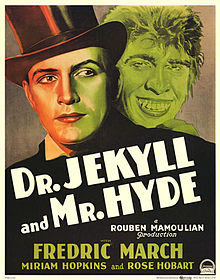 The EnCore book club meeting had its March Wednesday meeting yesterday, a gathering well-fueled by Noodle Street ambrosia and unspilled libations. The work in question was Robert Louis Stevenson’s very popular novella, the Strange Case of Dr. Jekyll and Mr. Hyde. Here were some of the talking points that came up in the discussion:
The EnCore book club meeting had its March Wednesday meeting yesterday, a gathering well-fueled by Noodle Street ambrosia and unspilled libations. The work in question was Robert Louis Stevenson’s very popular novella, the Strange Case of Dr. Jekyll and Mr. Hyde. Here were some of the talking points that came up in the discussion:
- The theme of duality. We compared this story to the book last tackled by the book club, Edmund Spenser’s The Faerie Queene: Bad guys are the ones who can transform their appearance at will, appearing virtuous or not, and thus they represent the evil of inconstancy and mutability. What does it say about the supposedly good Jekyll that he chooses to transform himself, even if his intentions were originally virtuous?
- Which leads us to Jekyll’s original intentions with the potion: was he trying to be Mother Theresa, and ended up Charlie Manson?
- The consideration of science: The Frankensteinian fear of “unnaturalness” in science. Is this due to science’s inherent lack of morality, its status as knowledge which is “neither good or bad, but thinking makes it so?” (Hamlet, Act II, Scene 2).
- Homosexual themes: The ever-present fearful scourge of Victorian men. Stevenson was friends with figures like Wilde, is this what he meant by Jekyll’s constant struggle with “unnatural urges”?
- Utterson is the dry lawyer, but everybody wants to share their secrets with him. This could be due to his “utter” rationality, but also to the fact that, as a lawyer, he does understand realistic human impulses, even if he doesn’t give in to them himself.
- Which leads to a very important observation: Victorians suffered from the suffocating pressures of keeping up appearances. It seems to matter less what you do than that nobody witnesses you doing it. The story portrays how even a good man like Jekyll has been pushed to wildly desire and crave freedom from restraints, to be wicked and carefree in light of these terrifically harsh standards of perfect, moral, upright English behavior.
- What causes Hyde’s takeover: Was the potion truly made with a defective (and thus effective) salt, or was it Jekyll’s embrace of evil that traps him as Hyde? Is the potion like the Jim Carrey movie The Mask, which involves a wooden mask that brings the wearer’s “innermost desires to life”?
- Hyde as the id: another view is that Hyde is not evil per se, but rather a physical manifestation of pure impulse. Are the Victorians horrified by such lack of restraint (seen as some kind of undefinable deformity, impossible to pin down from visually witnessing it) rather than his evil deeds?
- This whole discussion came up without structure, pre-established goals, or strict adherence to the material (read: you don’t have to read the book beforehand). What are you waiting for? Join us on the first Wednesday of every month.
